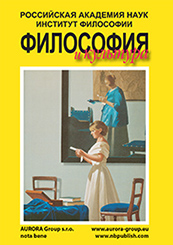Editor-in-Chief's column
Reference:
Gurevich, P. S. (2009). Meaning of Life and Devotion to It. Philosophy and Culture, 9. https://en.nbpublish.com/library_read_article.php?id=56942
Abstract:
Review: according to the author, the meaning of life is a regulative term essential for any developed system of world perception. In this article the author analyzed how the views on the meaning of life and happiness developed throughout ages
Keywords:
philosophy, history of philosophy, meaning of life, happiness
Philosophical anthropology
Reference:
Spirova, E. M. (2009). Auguste Comte about Human Nature. Philosophy and Culture, 9. https://en.nbpublish.com/library_read_article.php?id=56943
Abstract:
Review: the author analyzed anthropological views of a famous positivist Auguste Comte. The article considers his conception of human nature. Special attention is given to the social context of anthropological reflection
Keywords:
philosophy, philosophical anthropology, human being, human nature, organism, biological nature of a human, society, politics, government
Spiritual and moral search
Reference:
Gurevich, P. S. (2009). «...LET ME HUMBLY...». Afterword devoted to the 75th anniversary of the great Russian philosopher Erih Yuryevich Solovyev. Philosophy and Culture, 9. https://en.nbpublish.com/library_read_article.php?id=56944
Abstract:
Review: the article is devoted to creative work of a great Russian philosopher Erih Yurevich Solovyev. The author underlined unique features of the jubilee’s writing style
Keywords:
philosophy, morals, ethics, public morals, law, categorical imperative, personality, anthropology, historicism, the Reformation
The rational and the irrational
Reference:
Rozin, V. M. (2009). Can Esoterics be Considered a Science and if Yes, then What is a Science?. Philosophy and Culture, 9. https://en.nbpublish.com/library_read_article.php?id=56945
Abstract:
Review: the author compared one of esoteric tradition which is structured as a science, to regular sciences. It is shown that “esoteric sciences” do resemble regular sciences in a number of key parameters (devotion to learning, construction of “ideal” objects, detection of application environment, problems and facts, argumentation). The article covers special features of esoterics and how esoteric perception of the world is formed. The author suggested that “esoteric sciences” should be considered as “untraditional” type of science
Keywords:
philosophy, science, esotericism, truth, practice, reality, conscience, episteme, personality, transformation, untraditional science
The dialogue of cultures
Reference:
Beskova, I. A. (2009). Types of Cultures and Human Mentality. Philosophy and Culture, 9. https://en.nbpublish.com/library_read_article.php?id=56946
Abstract:
Review: the article considers the questions on how various types of culture correlate with peculiarities of human mentality. The author formed a hypothesis about sinistrocerebral (discursive) and dextrocerebral (intuitive) cultures. By analyzing corresponding texts, the author illustrated some features of such cultures. It is shown that, even though such separation is quite relative, it allows to underline some interesting aspects of cognitive strategies and cognitive styles. The author also viewed the problem of relation between intellect and culture
Keywords:
philosophy, mentality, culture, creativity, intellect, information, contradictory, tests, evolution, cognitive
Theological foundations of being
Reference:
Kleschev, D. S. (2009). Wickedness of Antichrist and Logical Paradoxes in Math. Philosophy and Culture, 9. https://en.nbpublish.com/library_read_article.php?id=56947
Abstract:
Review: the author continued to reflect on the two mathematical conceptions of the infinity. This time he focused his attention on logical foundation of antinomy of the truth and false proposed by Florensky, mathematician and priest
Keywords:
philosophy, infinity, topical, potential, Cantor, Zenkin, Florensky, antinomy, Antichrist, religion
Religions and religious renaissance
Reference:
Kananykina, E. S. (2009). Pedagogics of Religious Morals. Philosophy and Culture, 9. https://en.nbpublish.com/library_read_article.php?id=56948
Abstract:
Review: great pedagocial epos by scientists and philosophers of the Ancient East, North Africa, West Asia and Middle Asia provided the basis for modern up-bringing traditions practiced in those continents. The main principles of these traditions form the content of historical and normative documents dedicated to the idea of up-bringing and teaching. All modern systems of education in Africa and East conformed in legal and normative acts are based on such didactic views of the olden times
Keywords:
philosophy, cultural sciences, religion, morals, law, pedagogics, arabization, culture, up-bringing, Koran
Philosophy of law
Reference:
Saidov, A. H. (2009). Immanuel Kant’s System of Philosophy about Law and Government. Part 1. Philosophy and Culture, 9. https://en.nbpublish.com/library_read_article.php?id=56949
Abstract:
Review: the article covers the basics of Kant’s teaching about law and government, particularly, such topics as freedom and categorical imperative, Kant’s understanding of law and juridical axiology as components of Kant’s system of philosophy. The author also touched upon the central problems of Kant’s philosophy of government: origin of the government, legal state, separation of powers and form of government
Keywords:
philosophy, Immanuel Kant, law, government, freedom, categorical imperative, understanding of law, juridical axiology, legal state, separation of powers, form of government, philosophy of law and government
History of ideas and teachings
Reference:
Sorokina, Yu. V. (2009). Historicism and Natural Law. Philosophy and Culture, 9. https://en.nbpublish.com/library_read_article.php?id=56950
Abstract:
Review: the article is devoted to historicism as the method of learning the evolution of law. The author covered some ideas related to law and philosophy and analyzed some philosophers’ views
Keywords:
philosophy, historicism, evolution, revolution, law, poverty, romanticism, idea, natural, theory
The stream of books
Reference:
Gurevich, P. S. (2009). Phenomenology of Spiritual Tradition. Philosophy and Culture, 9. https://en.nbpublish.com/library_read_article.php?id=56951
Abstract:
Review: comments on selected works “Mysticism: Theory and History”. The book covers a wide range of theoretical and historiographical problems reflecting peculiarities of mysticism contrary to other types of belief oriented at the sacral beginning
Keywords:
philosophy, religion, history of philosophy, religious studies, mysticism, spiritual tradition
The stream of books
Reference:
Gurevich, P. S. (2009). Phenomenon of Civilization Transformation. Philosophy and Culture, 9. https://en.nbpublish.com/library_read_article.php?id=56952
Abstract:
Review: review of selected articles “Transformation of Culture in a Global Information society”. The book is devoted to viewing the phenomenon of globalization in a modern information society
Keywords:
philosophy, history, globalization, information society
 This work is licensed under a Creative Commons Attribution-NonCommercial 4.0 International License.
This work is licensed under a Creative Commons Attribution-NonCommercial 4.0 International License.
 Eng
Eng












 © 1998 – 2025 Nota Bene. Publishing Technologies. NB-Media Ltd.
© 1998 – 2025 Nota Bene. Publishing Technologies. NB-Media Ltd.




